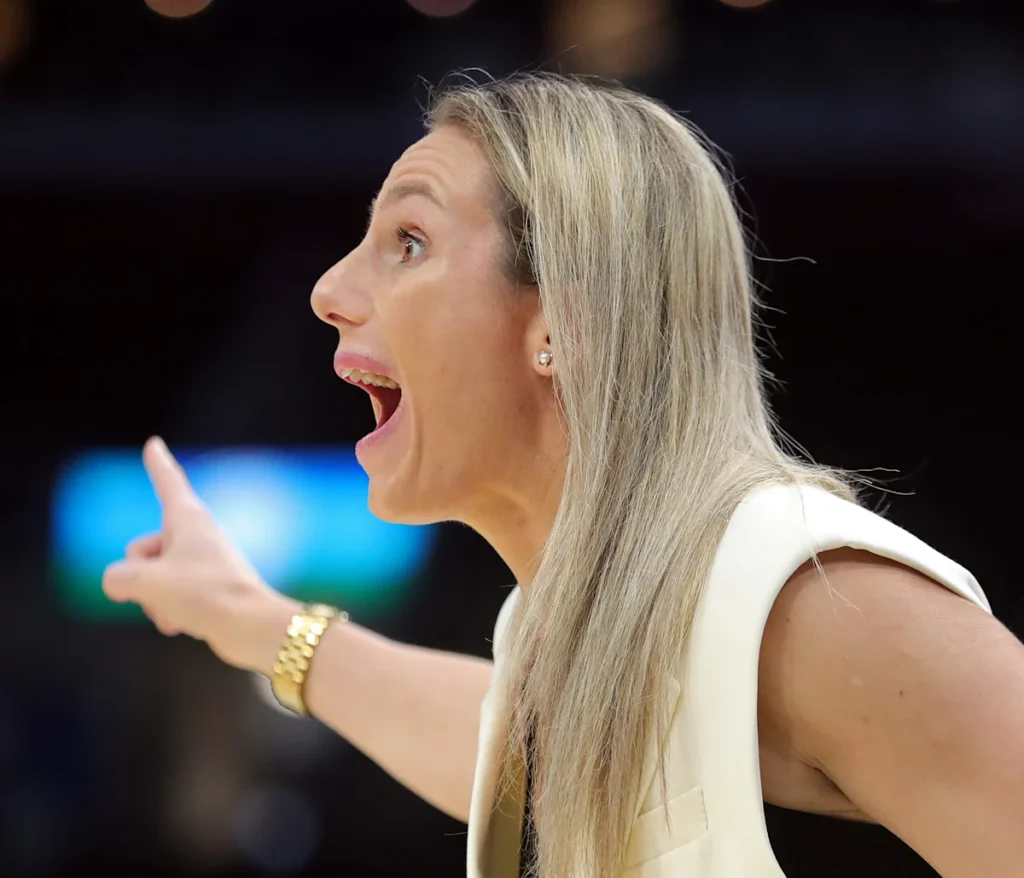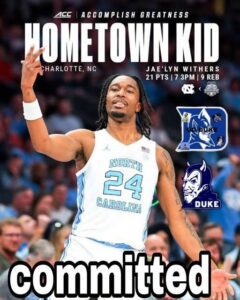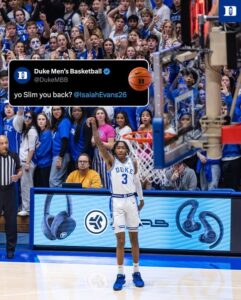
“Bear Down, Baby”: Becky Burke is named the new women’s basketball coach for the Arizona Wildcats.
TUCSON, Ariz. — The University of Arizona has found its next leader on the sidelines, and she’s bringing a fiery passion, a fresh vision, and an uncompromising drive to win. Becky Burke was officially announced as the new head coach of the Arizona Wildcats women’s basketball team, stepping into a role once held by trailblazer Adia Barnes and taking the reins of a program that has seen both exhilarating highs and humbling resets in recent years.
“Bear Down, Baby,” Burke said with a grin during her introductory press conference, standing confidently in front of a crowd of boosters, players, and administrators. “This is a dream job. Arizona is a place where women’s basketball matters—and we’re going to make it matter even more.”
Burke’s appointment marks a new era for the Wildcats, a proud Pac-12 (soon to be Big 12) program that once reached the pinnacle with a 2021 NCAA title game appearance but has since struggled to replicate that success. Now, with Burke’s fast-paced philosophy and strong player-development credentials, Arizona hopes to reestablish itself among the national elite.
Who Is Becky Burke?
For fans unfamiliar with Burke’s journey, her resume may come as a pleasant surprise. Though only 34 years old, she’s already compiled a decade of coaching experience and is widely respected for her ability to turn around programs and connect with players on a personal level.
A former sharpshooter at the University of Louisville, Burke was known for her three-point stroke and floor leadership under head coach Jeff Walz. She helped lead the Cardinals to multiple NCAA Tournament appearances, including a Final Four run in 2009. After college, she played professionally overseas before turning to coaching in her mid-20s.
Her first head coaching role came at the NAIA level with Embry-Riddle Aeronautical University, where she immediately made waves with an up-tempo, high-scoring system. She later transitioned to the NCAA Division I level, taking over the University of Charleston before serving as head coach at USC Upstate and then Buffalo.
It was her time at Buffalo that solidified her reputation. In just two seasons, Burke took the Bulls to postseason play and instilled a culture of toughness and self-belief that caught the attention of Power Five programs. Arizona came calling, and Burke couldn’t resist the chance to lead a major program with history and ambition.
“I’ve worked my whole life for this moment,” she said. “To be at a place like Arizona, where there’s a tradition of greatness, is everything I’ve ever wanted.”
A Program in Transition
Burke replaces Adia Barnes, the former Arizona legend who led the Wildcats to their first-ever NCAA championship game appearance in 2021. Barnes’ impact on the program was immeasurable—she rebuilt Arizona from a struggling team into a powerhouse, attracting elite recruits and making Tucson a destination.
But the momentum began to slow after that historic run. The Wildcats failed to advance past the second round of the NCAA Tournament in the following seasons, and key departures via the transfer portal weakened the roster. In 2024, Arizona missed the NCAA Tournament altogether and finished with a losing record in conference play.
When Barnes stepped down to pursue new opportunities—rumored to include broadcasting and involvement in player development at the professional level—the program found itself at a crossroads.
Arizona athletic director Desireé Reed-Francois acted swiftly and decisively. She targeted Burke early in the process, impressed by her energy, coaching acumen, and ability to build relationships with players.
“She’s a rising star, plain and simple,” Reed-Francois said. “Becky brings a bold, aggressive vision that aligns with what we want Arizona women’s basketball to be: fearless, innovative, and relentless.”
Building the Future, Fast
Burke is wasting no time in reshaping the program. She’s already begun assembling her coaching staff, prioritizing both tactical expertise and recruiting prowess. Early reports indicate that she plans to bring in assistants with deep ties to both West Coast and national AAU programs, aiming to tap into elite talent pipelines.
“She’s a grinder,” said one Division I assistant familiar with Burke’s style. “She’s in the gym at 6 a.m., watching film at midnight. Players feed off that. She doesn’t ask for respect—she earns it every day.”
In terms of on-court style, fans can expect a noticeable shift. Burke is known for running a fast-paced, aggressive offense that emphasizes spacing, tempo, and quick decision-making. Her teams play with confidence, often launching three-pointers early in the shot clock and using pressure defense to force turnovers.
“It’s going to be fun,” Burke said. “We’re going to play fast, we’re going to play free, and we’re going to compete every second we’re on the floor. This is going to be a team you want to watch.”
But rebuilding won’t happen overnight. Arizona’s roster has thinned due to the transfer portal, and Burke will need to act quickly to fill scholarships. The staff is expected to be aggressive in the portal themselves, targeting experienced guards and versatile forwards who fit Burke’s uptempo scheme.
“This is the new era of college basketball,” Burke said. “You have to build quickly, but you also have to build the right way. Culture still matters. Accountability still matters.”
Winning the Room
Perhaps Burke’s greatest strength is her ability to connect—something that was immediately evident in her first meetings with the Wildcats players.
“She walked in and it was like, ‘Boom,’ instant energy,” said sophomore guard Marissa Sanchez. “She listened to us, asked what we wanted from the program. You could tell she cared—not just about winning, but about us as people.”
That player-first mindset is part of what made her so successful at her previous stops. Former players describe her as demanding but deeply invested, someone who holds everyone to a high standard without sacrificing empathy.
“She’ll get on you, for sure,” said former Buffalo star Summer Hemphill. “But she’s the first person to hype you up, too. She celebrates your success. That makes you want to go hard for her.”
Burke understands the importance of visibility and connection off the court as well. She’s already made appearances on campus, attended other athletic events, and promised an open-door policy for fans and media alike.
“Tucson is a basketball town,” she said. “We want McKale Center rocking. We want people proud to wear Arizona gear again. That’s on us to earn—and we will.”
The Road Ahead
Burke inherits both challenges and opportunities. Arizona will be entering the Big 12 next season, a conference filled with top-tier competition, including Baylor, Texas, Kansas State, and rising powers like Iowa State and UCF. It’s a league where every night is a battle, and where the margins are razor-thin.
But Burke isn’t shying away from the task.
“I didn’t come here to rebuild slowly—I came here to compete right away,” she said. “We’re going to set the tone from day one. Our goals are big. We’re not afraid to say that out loud.”
Recruiting will be key. Burke has already begun reaching out to high-profile 2025 and 2026 prospects, many of whom are intrigued by her modern approach and player-friendly philosophy. With the right combination of portal additions and high school commitments, Arizona could find itself on a faster track than expected.
There’s also a wave of returning talent that Burke hopes to retain and develop. While several players entered the transfer portal following Barnes’ departure, some are reconsidering now that Burke has arrived. Her message to them? “Let’s do something special—together.”
A Message to Wildcat Nation
Burke ended her press conference with a direct appeal to fans.
“I need you,” she said. “These players need you. We’re going to work our tails off every single day to make you proud. And when we win—and we will win—I want you to know you were part of it from the beginning.”
That’s the energy Arizona fans have been hoping for. A fresh start, a passionate leader, and a promise of bold basketball returning to McKale.
Becky Burke may be young, but she’s battle-tested, and she’s not here to play it safe. She’s here to compete, connect, and conquer.
“Bear Down, Baby,” she repeated as she walked off the stage, nodding to the sea of red-and-blue in the room.
And just like that, a new era of Arizona women’s basketball began—with confidence, conviction, and a coach ready to blaze her own trail.





